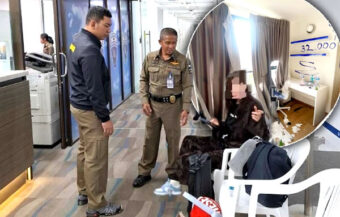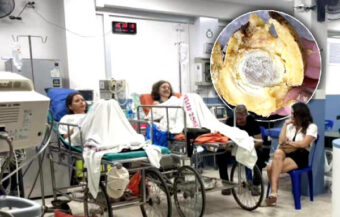Herd immunity study by Chulalongkorn University on a village in the Thung Yang Daeng district of southern Pattani. It comes, as around the world, people are beginning to question the response of governments and the huge economic loss caused by lockdown measures. Sweden’s singular approach has emerged as a source of increasing controversy while the role of the media and society itself is also in the spotlight.
Thailand’s authorities have fared well in protecting the country against the Covid 19 virus but it is not yet clear how the kingdom will return to complete normality. The answer will be herd immunity whether this is achieved through a vaccine or by natural means. On Monday, it was revealed that Chulalongkorn University has commenced a herd immunity study centred on a small village in Pattani. This comes as the controversial approach taken by Sweden, which did not shut down its economy, begins to draw more strident critics and supporters as the world begins to weigh up whether it got it right or wrong in its reaction to this global pandemic.

Even as Thailand is making impressive strides towards the development of the kingdom’s own vaccine against the Covid 19 virus with testing currently underway on monkeys, it is also pursuing another initiative based on the herd immunity theory.
Details emerged on Monday of a small community-based study in a Pattani village located in the Thung Yang Daeng district in the southern part of the Muslim majority province.
‘Pattani Model’ may become very influential
The important research is being led by Dr Wiput Phoolcharaen of Chulalongkorn University and is being called the ‘Pattani Model’ among those familiar with the project.
The village being tested has a population of 1,070 people. Dr Wiput, on Monday, described it as the perfect sample site for his scientific study.
‘They are a close-knit community. When one family member got infected, others were infected,’ Dr Wiput explained on Monday.
He said that the initial contact with the village was not to conduct this research but to trial Covid 19 test kits which had been developed by the Chulalongkorn University Faculty of Pharmaceutical Sciences.
Pattani became a Covid 19 hotspot in mid-April when the village was used to trial antibody test kits
Pattani became a hotspot for the virus in the middle of April when 3 sub-districts in the province had to be shut down by order of the Governor of Pattani province, Kraisorn Wisitwong. 82 people were found to be infected.
The province has had a total of 92 infections to date of which 32 have come from people outside the province.
Of the remainder, no fewer than 20 have come from the small village which is being used for the study.
New study involves taking monthly blood tests from 80% of the population of the small Pattani village
Now, monthly blood tests in the village are being conducted using antibody tests to particularly identify people who have had the infection but who may also be asymptomatic.
80% of the population of the village is taking part in the research over a period of one year.
Most samples show some level of immunity
Dr Wiput has said that most blood samples taken, so far, show some level of immunity already developing against the virus although the study was still in its early stages.
The current figures show a small percentage of those sampled with immunity from Covid 19.
These were 1.39% of children from 1 to 10 years old, 1.4% of those from 11 to 20, 1.18% of those from 21 to 30, 2.2% of those from 31 to 40n and 0.82% of those from 41 to 50.
The figures for the older population were noticeably higher. 6.19% of those from 51 to 60 had immunity while the figure was 5.43% for those over 50.
Too early to suggest if herd immunity is developing in the village being tested says study boss Dr Wupit
At present, the research leader says it is too early to suggest if herd immunity is developing.
The researchers in the study will now begin to look at the nature and strength of these immunities including whether they provide an effective screen against the disease.
Herd immunity ultimately is the key to resolving the Covid 19 threat whether that is achieved through a naturally occurring condition or through vaccination.
Herd immunity occurs when 50 to 70% of the population develop antibodies or immunity
The ideal situation is achieved when between 50 to 70% of the population develops this state.
Encouraging research in recent weeks in South Korea has shown that, despite fears, it is likely that an infected person cannot be reinfected attributing the confusion on this subject to false-positives in flawed Covid 19 testing.
Once herd immunity is achieved, the spread of the virus becomes difficult for it to maintain since it is blocked off by already infected potential hosts.
The theory has divided opinions
The theory has divided opinion in the medical and expert community throughout the world. It also questioned the efficacy and decision making of most governments, including Thailand, which introduced lockdowns with massive economic consequences.
Sweden used herd immunity only as part of its response to this pandemic including limited closures
The herd immunity approach has been used by Sweden as part of its approach to the Covid 19 pandemic threat that also involved the closure of some schools and actions to screen off older or more vulnerable people combined with a no-nonsense guide to the public.
The Swedish approach did not involve shuttering large swathes of the economy and commercial activity which by and large, remained open.
The country has recorded a considerably higher death rate than its Nordic neighbours but well below European countries such as Belgium, Spain and Italy as well as the UK.
The Swedish death rate is currently at 38 per 100,000 compared to 80 for Belgium,60 for Spain and 53 for the UK and Italy. The United States death rate is below Sweden at 29. Thailand’s figure, amazingly, is 0.082.
Herd immunity may be a viable option for Thailand says Chulalongkorn expert as study begins
Dr Wupit of Chulalongkorn University highlights that herd immunity could become a viable option for Thailand provided there was evidence that it can work. This is the goal of the study currently underway.
‘Herd immunity is rarely explored as a Covid-19 treatment in Thailand. But if it is proven possible and effective, there may be no need for vaccines,’ said Dr Wupid.
Architect of Swedish response criticised but warns that waiting for a vaccine is also quite perilous
His comments come as the architect of the Swedish response, its chief epidemiologist, Anders Tegnell currently finds himself fending off criticism from parties both within and without the Scandinavian kingdom. He has defended himself by warning that waiting for a vaccine is also a very risky proposition.
‘A lot of people claim that the Swedish strategy is very risky but I would say that putting so much faith in a vaccine is also quite risky,’ he said this week.
His comments come as there are reports that the immunity rate in Sweden’s capital, Stockholm, is only 7.3% despite claims by the Swedish Public Health Agency weeks ago that it was near 40%.
Sweden is better protected against a second wave of the virus which is likely because of herd immunity
Speaking to the Financial Times in early May, Mr Tegnell also relayed another benefit of Sweden’s coronavirus approach.
‘In the autumn there will be a second wave,’ Tegnell said. ‘Sweden will have a high level of immunity and the number of cases will probably be quite low.’
He warned that this would not be the case for Sweden’s more cautious neighbours such as Finland.
Norwegian Prime Minister expresses regret for the extent of the lockdown in that country – acted out of fear she admits after Italian images on TV reports
Last Wednesday, the prime minister of one of Sweden’s other near neighbours, Norway, expressed her doubts on whether that country was right to go into lockdown mode.
Erna Solberg made the admission on Norwegian TV. She admitted to the nation that she had panicked.
‘Was it necessary to close schools?’ the prime minister asked.
‘Perhaps not. I probably took many of the decisions out of fear.’
The Norwegian leader said that she had been influenced by the media coverage emanating from Italy which compelled her to act.
Italian doctors revealed, this week, that the potency of the Covid 19 virus is decreasing among ill patients
Doctors in Italy are reporting this week that the virus infection appears to have become less severe and patients are being cured faster as the country’s rate of infection, hospitalisation and death toll all spiral downwards.
WHO’s Mike Ryan now more critical of Sweden’s approach – people are not ‘herds’ and warns of brutal calculations inherent in such thinking
On the other hand, Dr Mike Ryan, the epidemiologist director of the World Health Organization’s Emergencies Programme, who once appeared to accept Sweden’s approach as a viable alternative model now appears to have adopted a less than approving attitude.
‘I think we need to be really careful when we use terms in this way around natural infections in humans because it can lead to a very brutal arithmetic which does not put people and life and suffering at the centre of that equation,’ he said this week.
He warned that human beings were not ‘herds’ and dabbling with this approach would only lead to further deaths.
Sweden has a high death rate but lower than the UK, Spain and Italy. Higher than the USA
Sweden has recorded 4,400 deaths so far but still has a lower death rate than the UK, Italy and Spain and has seen hospitalisations in the northern European kingdom come down without disrupting its healthcare system.
The Swedish health system was never overloaded due to this approach but the Prime Minister, Stefan Lofven and Mr Tegnell have both accepted the country’s flawed response to nursing homes which have accounted for nearly half the deaths caused by the disease.
Thai success linked to the healthcare system, sunlight and cultural approach to the elderly in society
Several reasons have been put forward for Thailand’s undoubted success at curtailing the disease starting with its health care system which has a proven track record guided by decades of cooperation with US agencies in dealing with such health threats.
Another reason has been the level of sunlight in the kingdom which is extremely effective at killing the virus if left exposed externally.
Also, an additional key factor could be the absence of nursing homes in Thailand at critical levels due to Thailand’s traditional culture and the kingdom’s societal attitude towards older people and elderly family members.
The strong link between the high death rate in western countries and nursing homes has been seen in nearly every country.
It has sparked a deeply uncomfortable debate and sharply defined concerns as to how the aged are cared for in developed, western economies.
Sustainability of lockdown measures now being questioned but also, disturbing questions about society and the media have emerged
It is also clear that the world has reached a point where the sustainability of lockdown measures economically is now being questioned.
The measures have also sparked questions about civil rights despite overwhelming public support.
The economic price of the Covid 19 crisis is only now beginning but it will be offset, at least in the short term, by the enthusiasm of getting economies worldwide back to work.
The crisis, however, will leave disturbing questions behind in its aftermath among them the future of China and the US-Chinese relationship but also the role of the media as well as the state of politics and governance in our societies.
Not the greatest health threat in a century
Currently, over 370,000 people have died worldwide from this virus but another virus outbreak and pandemic in 1968 and 1969 killed an estimated 1 million to 4 million people.
Most media coverage of this pandemic has described it as the greatest world health crisis in a century. It is not.
H3N2 virus killed between 1 million and 4 million people between 1968 and 1970 – a bigger pandemic
The H3N2 virus impacted the world from 1968 to 1970 and indeed this virus is still circulating and adapting, a process known as antigenic drift.
Over 100,000 people died in the United States alone when returning US soldiers from Vietnam brought the disease back from Asia in 1968.
The virus originated officially in Hong Kong but there are suspicions that it also originated in China. It, itself, followed a 1957 virus which originated in China called the Asian Flu.
The impact of the disease in Europe was so severe that thrash collectors in Berlin had to bury the dead without ceremony. 60,000 died between what was then West and East Germany.
Yet, there were no economic lockdowns anywhere or curtailment of civil liberties.
There was widespread disruption to business and industry as absenteeism grew and there were emergency response centres in New York, London and other cities but for the most part, people took it in their stride.
This was a bigger pandemic than the Covid 19 virus.
Today it is still being vaccinated against as a more dangerous form of the seasonal flu. A hard question must be asked.
Has the world, in just over 50 years, become more caring or hysterical? Or both?
Further reading:
Thailand’s economy has become dependent on government expenditure to stay above water
Risk must be taken to open up Thailand and its tourism industry without delay says richest man
‘New normal’ life and economy could be here for 9 months warns Thai Prime Minister on Tuesday
Top Thai executives roll out plans but ultimately ‘herd immunity’ may be the basis for recovery
Government to control rollback of lockdown measures to reopen all businesses from May until July
Some shops and outlets to reopen in Bangkok but measures to be reimposed if infection rate rises



















